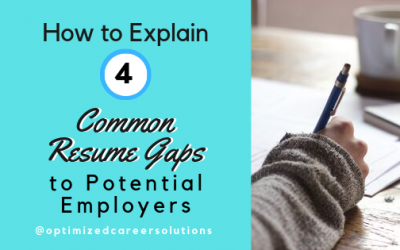Do you have gaps in your employment? It can be scary and a red flag for a potential employer. They may expect the worst. What were you doing with all that time when you weren’t working?
Never fear. An employment gap isn’t a death sentence (job-wise). Most employers understand that people take time off whether it’s because of an illness, to go back to school, or maybe even just to travel.
While shorter resume gaps are usually of no consequence, longer gaps (think 2+ years) will need an honest and brief explanation. The interviewer will want to know what happened, why, and if you can explain why it won’t suddenly happen again while working for them. So, be honest, prepared, and confident when explaining your gaps. Here’s how.

There are plenty of reasons to (honestly) explain gaps on your resume, but here are 4 really good ones.
1) Illness
Did you suffer from an illness, either physical or mental, and had to take some time off work to heal? You don’t have to go into a long, personal explanation in order to get the point across. Brevity is key. Mention how proud you are to have overcome the challenge, don’t go into details, and move the conversation back to the present.
A simple, “I was in an accident and needed to take time off to recover. I’m fully healed and ready to go.” will suffice. Make sure to let them know that it won’t be a recurring problem (as long as that’s the truth) and there should be no issue.

2) Finding Your Way
You decided to go back to school or you needed a break to do some traveling. Sometimes you find out that you aren’t happy where you are and need to redirect or simply want to get more education.
This is a perfect opportunity to let a potential employer see that you are interested in personal development. Don’t tell them that you spent a few years partying in a foreign country. Instead, mention any skills you developed or volunteer work you did.
Taking time off for school is perhaps one of the easiest to explain. You can let them know that you wanted to expand your career options (just make sure NOT to mention that you hated your last job).
A great answer if asked is, “I was fortunate to take some time in the short term to figure out my long term goals, and I’m glad I did because it led me here. I’m ready to take the skills I learned and bring along with 100% dedication to your company.”

3) Family Care
Sometimes you have the opportunity to be a stay-at-home parent or there is a family member that needs care. Both of these things require a huge number of skills and you now possess them in abundance.
If an interviewer makes you feel anything less than heroic, it may be a bad fit. You just spent years caring for children or older relatives and are a badass.
Let them know that you’re excited to recommit to your career and of any skills relevant in your industry that you’ve kept up to date.
A great answer if asked is, “We were fortunate to allow me time away from the office to focus on raising my 2 children. My experience as a manager at my previous company helped me ease into parenthood and, I gotta say, I’m sure none of your employees will ever be as demanding as toddlers!* I’m ready to jump back into that manager role because I’ve never really left!”
*Note: Humor will help endear others to you and will help beak any tension you or the hiring manager may be feeling!

4) Job Loss
No one is comfortable telling an interviewer about losing a job. However, it’s important to focus on the positives (skills and achievements you gained while working there) and to not bad-mouth the company. Explaining your accomplishments will only make you look good and who doesn’t want that? If you were fired, make sure to keep your answer concise, to the point, and keep your attitude humble. Remember, the truth will always come out. If you were fired, it means there was a lesson to be learned. Employers value adaptability and the potential to grow over who was right and who was wrong.
A simple answer could be: “I was let go from that position which at first was a shock. I used the time that I was unemployed to reflect on what went wrong and I realized that I could have done XYZ better. I spent time honing my skills and reflecting on what type of company culture I would truly excel in and it led me to you!”
The most important thing to remember is that it’s never okay to lie on your resume. As long as you’re honest, prepared, confident, and maybe even a little humble with a dash of humor, then there’s no reason to worry about the gaps on your resume. Things happen and people understand. Have your explanation prepared and practiced and you’ll ace that interview.
If you need help optimizing your resume to beat the 6-second recruiter test, applicant tracking systems, and the competition, make sure to schedule your free consultation here! We focus on optimized resumes and LinkedIn profiles as well as one on one coaching designed to keep you accountable and set you apart to ensure you reach your next career level.

